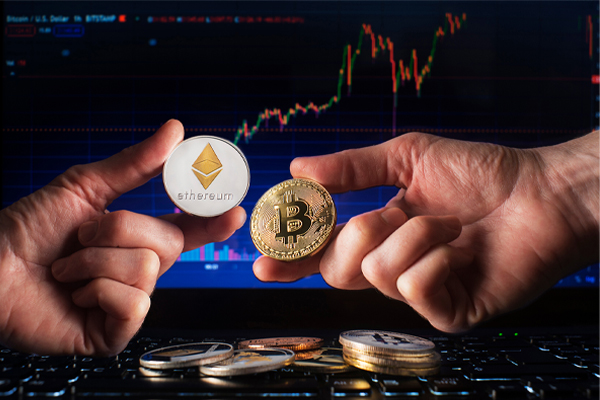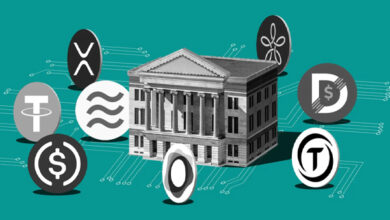Decentralized Finance (DeFi): The Evolution of Financial Systems
Decentralized Finance (DeFi) is redefining the financial landscape by leveraging blockchain technology to offer innovative alternatives to traditional financial systems. This article explores how DeFi is transforming cryptocurrency investments and the broader financial ecosystem, with a focus on platforms that embody this evolution.
The Emergence of DeFi and Its Transformative Impact on Finance
DeFi represents a seismic shift from traditional financial practices to a decentralized model that operates on blockchain technology. This transformation is characterized by the elimination of intermediaries and the introduction of new financial paradigms.
The Rise of DeFi: From Niche to Mainstream
The rise of DeFi can be traced back to the advent of blockchain technology, which provided the foundation for creating decentralized financial services. Unlike traditional finance, which relies on centralized institutions, DeFi platforms utilize blockchain to facilitate peer-to-peer transactions and financial services, enhancing accessibility and efficiency.
Core Principles of DeFi
DeFi is underpinned by several key principles:
– Decentralization: DeFi operates on decentralized networks, removing the need for traditional financial intermediaries and reducing central points of control.
– Transparency: Transactions are recorded on a public blockchain, providing transparency and reducing the risk of fraud and corruption.
– Immutability: Once recorded on the blockchain, transactions cannot be altered, ensuring a high level of data integrity and security.
Read more: Exploring the Risks and Rewards of Cryptocurrency Investment
Key Components of DeFi Platforms
Understanding the core components of DeFi platforms is crucial for navigating this new financial landscape. Each component plays a significant role in enabling decentralized financial activities.
Decentralized Exchanges (DEXs)
Decentralized exchanges like Uniswap and SushiSwap facilitate the trading of cryptocurrencies directly between users. These platforms use automated market makers (AMMs) to manage liquidity pools, allowing users to trade without relying on a central authority.
How DEXs Revolutionize Trading
DEXs offer several advantages over traditional exchanges, including lower fees, greater privacy, and the elimination of centralized control. By utilizing smart contracts and liquidity pools, DEXs provide a decentralized alternative to conventional trading platforms.

Lending and Borrowing Platforms
Platforms such as Aave and Compound represent significant advancements in DeFi lending and borrowing. These platforms allow users to earn interest on their cryptocurrency holdings or borrow assets by providing collateral, all without traditional intermediaries.
Benefits of DeFi Lending
DeFi lending platforms offer competitive interest rates and a global reach, enabling users to manage their assets more flexibly. The use of smart contracts ensures that transactions are secure and automated, enhancing the overall user experience.
Yield Farming and Staking
Yield farming and staking are strategies used to earn rewards on cryptocurrency investments. Yield farming involves providing liquidity to DeFi platforms in exchange for rewards, while staking involves locking up assets to support network operations.
Exploring Yield Farming
Yield farming can be highly lucrative but comes with associated risks, such as impermanent loss. Investors should carefully evaluate potential returns and risks before committing capital to yield farming strategies.
The Advantages of Investing in DeFi
Investing in DeFi offers several distinct benefits compared to traditional financial systems. These advantages make DeFi an appealing option for diversifying investment portfolios and exploring new financial opportunities.
Read more: Top 15 Cryptocurrencies to Watch in 2024
Enhanced Accessibility and Inclusivity
DeFi platforms like Posterity.biz, provide global access to financial services, allowing individuals from diverse geographical locations to participate in financial activities. This inclusivity democratizes access to financial opportunities and reduces barriers to entry.
Higher Potential Returns and Flexible Options
DeFi platforms often offer higher returns compared to traditional financial instruments. Investors can benefit from competitive interest rates, diverse investment options, and the potential for significant rewards through strategies like yield farming and staking.
Increased Security and Transparency
The decentralized nature of DeFi platforms enhances security by reducing the reliance on central points of control. Transparency is also a key advantage, as blockchain technology ensures that all transactions are recorded on a public ledger, providing visibility and reducing the risk of fraud.
Comparative Analysis: DeFi vs. Traditional Investment Platforms
A comparison between DeFi and traditional investment platforms highlights the advantages and challenges of each model. Understanding these differences is crucial for making informed investment decisions.
Centralization vs. Decentralization
Traditional financial systems rely on centralized institutions, which can lead to inefficiencies and higher costs. DeFi platforms, such as eToro, Posterity, Robinhood, on the other hand, operate on decentralized networks, eliminating intermediaries and offering greater control and flexibility for users.
Regulatory Considerations
Traditional financial systems are subject to regulatory oversight, which can provide investor protection but may also limit innovation. DeFi platforms operate in a less regulated environment, which fosters innovation but introduces potential risks related to regulatory uncertainty and lack of formal investor protections.
Notable DeFi Platforms and Their Offerings
Several DeFi platforms have gained prominence in the cryptocurrency investment space, each offering unique features and services. Understanding these platforms can help investors make informed decisions about their investments.
Read more: Beginner’s Guide to Investing in Cryptocurrency
Uniswap
Uniswap is a leading decentralized exchange (DEX) that allows users to trade cryptocurrencies using automated market makers and liquidity pools. Its user-friendly interface and low trading fees make it a popular choice for DeFi investors.
Aave
Aave is a prominent DeFi lending platform that offers a range of borrowing and lending options. Its innovative features, such as flash loans and credit delegation, enhance its appeal to both borrowers and lenders.
Compound
Compound is another major player in the DeFi lending space, providing users with the ability to earn interest on deposits and borrow assets against collateral. Its decentralized protocol ensures transparency and security for users.
Investing Safely in DeFi
While DeFi presents numerous opportunities, it is essential to approach investments with caution. Implementing best practices can help mitigate risks and ensure the security of your investments.
Selecting Reputable Platforms
Choosing reputable DeFi platforms is critical for safeguarding your assets. Platforms such as Uniswap, Aave, and Compound are known for their robust security measures and transparency, making them reliable options for DeFi investments.
Diversifying Investments
Diversification is a key strategy for managing risk in DeFi investments. Spread your investments across different platforms and assets to reduce potential losses and enhance overall returns.
Conducting Thorough Research
Before investing in any DeFi project, conduct thorough research to understand the platform’s technology, team, and community feedback. Assessing smart contracts, security features, and potential risks can help you make informed investment decisions.
The Future of DeFi and Its Role in Financial Innovation
The future of DeFi is poised to bring continued innovation and transformation to the financial landscape. Emerging trends and technological advancements will shape the evolution of DeFi and its impact on financial systems.
Emerging Trends in DeFi
Several trends are expected to influence the future of DeFi, including the integration of artificial intelligence (AI) for improved decision-making and the development of more user-friendly interfaces. The expansion of DeFi services into new markets will also play a crucial role in driving growth and innovation.
The Role of AI and Automation
The integration of AI and automation into DeFi platforms can enhance decision-making processes and improve user experiences. AI can analyze market trends, optimize investment strategies, and automate trading operations, making DeFi platforms more efficient and accessible.
Conclusion
Decentralized Finance (DeFi) represents a significant evolution in financial systems, offering new opportunities and challenges for cryptocurrency investments. By understanding the core principles of DeFi, exploring its key components, and implementing best practices for safe investment, individuals can navigate this dynamic landscape and capitalize on the benefits of decentralized financial services. The ongoing development of DeFi platforms will continue to reshape the future of finance, driving innovation and expanding opportunities for investors.
FAQs
What are the primary benefits of DeFi investments compared to traditional finance?
DeFi investments offer increased accessibility, higher potential returns, and greater transparency compared to traditional financial systems. DeFi platforms eliminate intermediaries, provide global access, and often offer competitive interest rates and flexible investment options.
How can I ensure the safety of my investments in DeFi?
To ensure the safety of your DeFi investments, select reputable platforms with strong security measures, diversify your investment portfolio, and conduct thorough research on the platforms and assets you are considering.
Which DeFi platforms are recommended for cryptocurrency investments?
Recommended DeFi platforms include Uniswap, Aave, and Compound. These platforms are known for their innovative features, security, and user-friendly interfaces, making them popular choices for DeFi investments.



